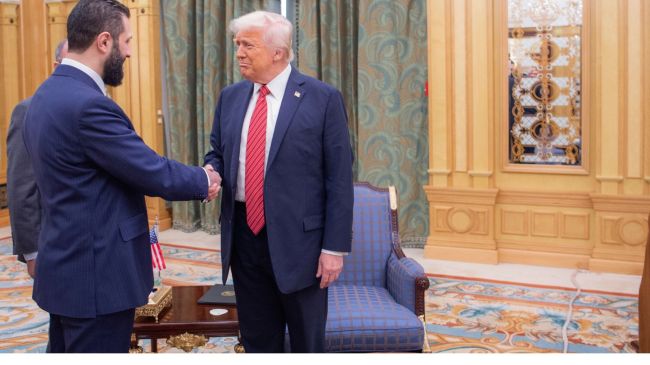Opinion What Trump’s recent reception of Syria’s Ahmed al-Sharaa reveals about America
Once an insurgent, Al-Sharaa now strolls Washington’s marble corridors, hailed as a ‘stabilising force’
 It is easy to justify these handshakes in the language of necessity, with words like “containment,” “stability,” and “regional security.” (AP)
It is easy to justify these handshakes in the language of necessity, with words like “containment,” “stability,” and “regional security.” (AP) The United States likes to call itself the world’s guardian of democracy and the moral compass of civilisation. Yet its record often reveals something darker: A recurring tendency to roll out the red carpet for tyrants, extremists, and state-designated terrorists, so long as they serve short-term American interests.
From Reagan’s cosying up to covert terrorists in the 1980s to Trump’s bizarre embrace of Syria’s Ahmed al-Sharaa, the US has perfected the art of selective morality and made hypocrisy an instrument of diplomacy.
In the 1980s, Ronald Reagan called the Soviet Union an “evil empire,” while secretly supplying arms to the Iranian regime through the Iran-Contra scandal — the same Tehran then listed as a state sponsor of terrorism. Reagan hailed the Afghan mujahideen as “freedom fighters” — many of whom later became architects of al-Qaeda. It was a pattern set early: When convenient, the US will sanctify the violent as “strategic partners,” baptising terror with the holy water of geopolitics.
Donald Trump’s recent reception of Syria’s Ahmed al-Sharaa at the White House marks the latest chapter in this theatre of absurdity. Sharaa, once an insurgent, now strolls Washington’s marble corridors, hailed as a “stabilising force.”
Meanwhile, Trump’s warm rapport with Pakistan’s Air Marshal Munir, despite his deep intelligence ties to networks that harboured the Taliban and allowed safe passage for militants, shows that Washington’s memory remains selective. Munir’s regime has been accused of shielding designated terror operatives while leveraging counterterrorism cooperation to extract aid and legitimacy — and yet, he too is treated as a partner, another guest at America’s diplomatic masquerade.
Just as Crown Prince Mohammed bin Salman was feted in Silicon Valley months after the murder of Jamal Khashoggi, or Vladimir Putin was granted summits even after invading neighbours, and Benjamin Netanyahu continues to receive standing ovations in the US Congress while presiding over civilian bombings in Gaza.
When America welcomes men with blood on their hands, it doesn’t just forgive them — it legitimises them. Every handshake is a rewriting of history; every joint press conference an act of moral laundering. The “war on terror” thus becomes a war of convenience — a branding exercise where the logo changes but the product remains the same.
This isn’t mere inconsistency; it’s systemic hypocrisy. To call some violence “terrorism” and others “self-defence” depending on the flag they fly is not a strategy — it’s a surrender of principle.
Reagan had the Contras. Clinton had Milosevic at Dayton. Bush had Musharraf in the Oval Office. Obama shook hands with regimes that surveilled, tortured, and silenced, including our own in a different garb. Trump has Sharaa and Munir. The American state, across administrations, has practised a kind of moral relativism dressed up as diplomacy. Each decade brings a new “partner in peace” whose résumé reads like an indictment.
It is easy to justify these handshakes in the language of necessity, with words like “containment,” “stability,” and “regional security.” But history shows that every time America courts a terrorist or tyrant, it pays later in blowback, blood, or betrayal. It’s time for Washington to decide whether it wants to lead by principle or by expedience — because every red carpet unrolled for someone like Al-Sharaa is one more thread pulled from the fabric of the republic itself.
The writer has served with the United Nations for nearly 24 years, including in Lebanon/Middle East, and was in Syria in 2007/8 before the Syrian civil war






